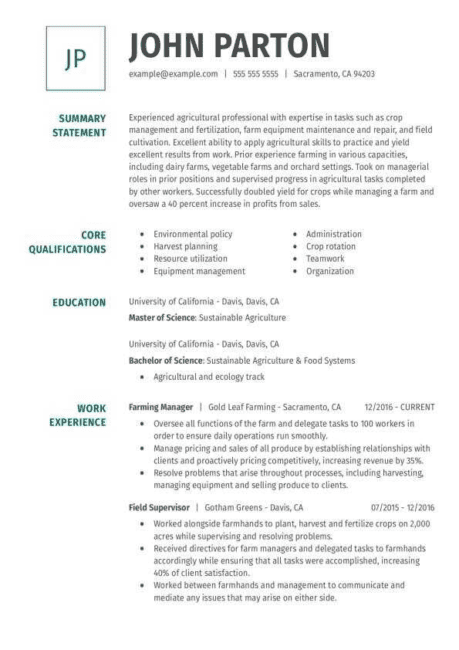If you have an interest in pursuing a career in agriculture, then you should know how to write an effective resume for an agricultural job. An effective resume gives you more guarantee at winning the job, so every resume you write for an agricultural job should be well planned.
An effective resume can help you communicate your qualifications to employers, showcase your skills and experience and move you forward in the hiring process. When writing a resume, it’s helpful to review what to include and how to construct your ideas.
If you’re interested in pursuing a job in agriculture, it’s important to have a strong resume that can alert prospective employers to your value as a candidate.
An agriculture resume is a document that shows prospective employers your relevant qualifications, skills and experience in agriculture. Agriculture is an important economic sector and involves cultivating the soil, growing crops, rearing livestock, preparing and distributing plant and animal products, performing experiments and maintaining healthy crops and livestock through best practices.
Read Also: What are The Job Prospects for Agricultural Careers?
Guide on How to Write an Effective Resume for an Agricultural Job

Writing an effective resume for an agricultural job is crucial to showcase your skills, qualifications, and experience to potential employers. Here’s a step-by-step guide with detailed explanations and examples:
1. Choose the Right Resume Format: Opt for a chronological or combination (also known as hybrid) resume format. These formats emphasize your work history, skills, and accomplishments.
2. Include a Strong Objective or Summary: Write a concise objective or summary statement that highlights your career goals and what you can bring to the role. Tailor it to the specific agricultural job you’re applying for.
Example (from above): “A dedicated and skilled agricultural professional with 5 years of experience in crop management and sustainable farming practices, seeking a position as a Farm Manager at XYZ Farm to apply my expertise in increasing agricultural productivity and profitability.”
3. Highlight Relevant Skills: List both technical and soft skills relevant to the agricultural industry.
Example: “Skills: Crop management, soil analysis, pest control, irrigation, farm equipment operation, team leadership, sustainable farming practices.”
4. Detail Your Work Experience: Emphasize your relevant work experience. Include the name of the employer, your job title, dates of employment, and detailed bullet points describing your responsibilities and achievements. Use quantifiable results to showcase your accomplishments.
5. Highlight Relevant Certifications and Education: List any certifications, licenses, or relevant coursework related to agriculture.
Example: “Education: Bachelor of Science in Agriculture, University of Agriculture, 20XX”
6. Include Additional Sections (if applicable): Add sections like ‘Awards and Honors,’ ‘Publications,’ or ‘Research Experience’ if you have relevant accomplishments in these areas.
7. Tailor Your Resume: Customize your resume for each job application by emphasizing skills and experiences that match the specific job requirements.
8. Proofread and Edit: Ensure there are no grammatical or spelling errors. A well-proofread resume demonstrates attention to detail.
9. Use a Professional Layout: Choose a clean and professional layout with consistent formatting (font, spacing, headings, etc.).
10. Keep it Concise: Aim for a one-page resume unless you have extensive relevant experience.
11. Keywords from the Job Posting: Analyze the job posting and incorporate relevant keywords and phrases into your resume. This can improve your chances of passing through applicant tracking systems (ATS) and catching the attention of recruiters.
12. Showcase Achievements and Impact: Use action verbs and metrics to demonstrate how your work contributed to the success of previous employers or projects. For example, instead of saying “Managed farm workers,” say “Led a team of 10 farm workers, resulting in a 20% increase in overall productivity.”
13. Include Agricultural Software and Technology Skills: Mention any proficiency in agricultural software, such as farm management software, GIS (Geographic Information Systems), or data analysis tools.
14. Highlight Sustainability and Environmental Practices: In today’s agricultural industry, sustainability and eco-friendly practices are highly valued. If you have experience in sustainable farming, organic farming, or environmental conservation, make sure to highlight it.
15. Volunteer and Community Involvement: If you’ve volunteered or been involved in community agricultural projects, include these experiences. They demonstrate your commitment to the field and your ability to work with diverse groups.
16. Networking and References: Consider adding a section for professional references or mentioning that references are available upon request. Ensure that you’ve asked for permission from your references before listing their names.
17. Use Action-Oriented Language: Begin each bullet point with a strong action verb to convey a sense of initiative and accomplishment. For example, “Implemented,” “Managed,” “Designed,” etc.
18. Tailor Your Resume to Different Agricultural Roles: If you’re applying for various types of agricultural positions (e.g., farm manager, agronomist, livestock specialist), create customized versions of your resume to highlight the most relevant skills and experiences for each role.
19. Professional Email Address: Ensure that your email address is professional and appropriate for job applications. Avoid using email addresses with nicknames or unrelated terms.
20. Include a Cover Letter: Whenever possible, submit a tailored cover letter along with your resume to provide more context and express your enthusiasm for the specific job.
21. Seek Feedback: Ask peers, mentors, or career advisors to review your resume and provide feedback. Fresh perspectives can help you improve your resume’s effectiveness.
22. Update Regularly: Continually update your resume to reflect your latest experiences and achievements. This will make it easier to apply for new opportunities as they arise.
Note that your resume serves as your first impression to potential employers. By following these guidelines and tailoring your resume to the job you’re applying for, you’ll increase your chances of standing out in the competitive field of agriculture and landing your desired job.
Remember that an effective agricultural resume should not only highlight your skills but also demonstrate your passion for and commitment to the field. Tailoring your resume to the specific job and showcasing your accomplishments will greatly increase your chances of landing an agricultural job.
Read Also: The Essential Guide to Wingspore Equipment Finance
